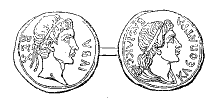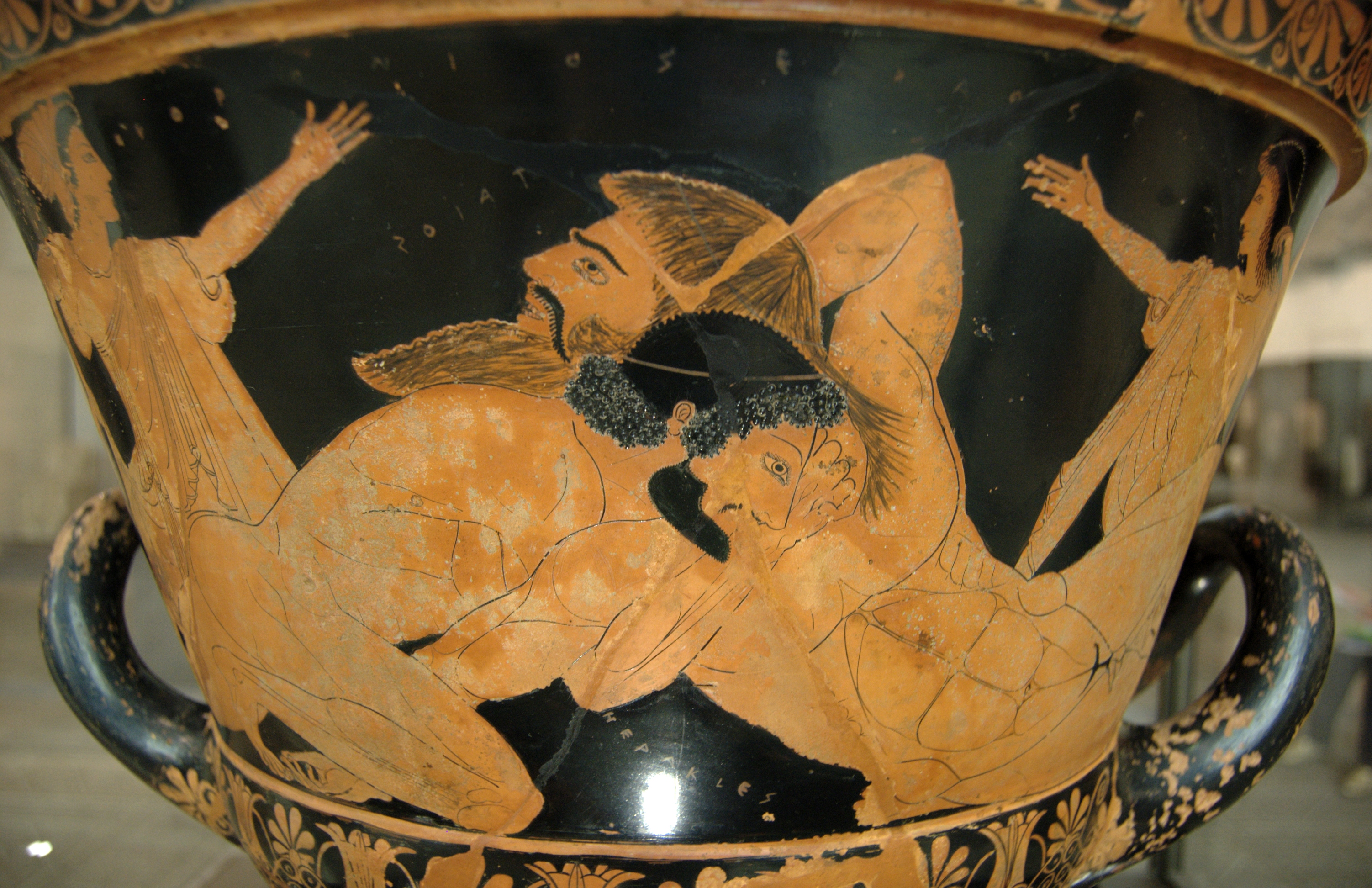|
Sufax
Sufax, Syphax, Sufaqs or Sophax (Ancient Greek: Σόφακος ''Sophaxus'') was a hero or demigod from the Traditional Berber religion, Berber and Greek mythology, Greek mythologies. Family According to the myth, Sufax was the son of goddess Tinjis from her second marriage to demigod Heracles, and the grandson of Zeus and mortal Alcmene.Hesiod, ''Shield of Heracles'1 ff./ref> His half-sister was likely Iphinoe (mythology), Iphinoe, and his half-brother (and possible half-nephew) was Palaemon (mythology), Palaemon, son of Iphinoe and Heracles. Mythology Sufax replaced his mother's first husband Antaeus as a guard of the country of the Berbers (or Imazighen). He is said to be the founder of Tangier in memory to his mother. According to the Berber mythology, many of the Berber people, Berber kings are descendants of Sufax, who defended their lands. He had a son, Diodorus, son of Suphax, Diodorus, who reigned over many North African Berber tribes with the help of the Twelve O ... [...More Info...] [...Related Items...] OR: [Wikipedia] [Google] [Baidu] |
Tinjis
Tinjis ( ber, translit=Tinja, ⵜⵉⵏⵊⴰ) (also called Tinga, and also spelled as Tingis) was a Libyan queen as the wife of King Antaeus in Berber and Greek mythology, and some kind of a female deity. Family Tinjis' husband was the son of Poseidon and Gaia. Tinjis bore Antaeus daughters named Alceis or Barce and probably Iphinoe who mothered Palaemon by the hero Heracles. Mythology The historian and archaeologist Mustapha Ouachi noticed that the city Tangier is geographically related to its myth. The mother of Antaeus was the goddess of the Earth whereas the father of Antaeus was Poseidon who was the god of the sea, according to the Libyan legend. In addition, Herodotus considered Poseidon to be an ancient Libyan god that was adopted by the ancient Greeks, like Athena. According to Plutarch, the Amazigh believed that Heracles consorted with Tinjis after the death of Antaeus and that Heracles and Tinjis were the parents of Sufax. According to their myth, Sufax built ... [...More Info...] [...Related Items...] OR: [Wikipedia] [Google] [Baidu] |
Syphax
Syphax (, ''Sýphax''; , ) was a king of the Masaesyli tribe of western Numidia (present-day Algeria) during the last quarter of the 3rd century BC. His story is told in Livy's '' Ab Urbe Condita'' (written c. 27–25 BC).Livy: ''Ab urbe condita'', vol. VIII, bks. xxviii-xxx Loeb Classical Edn, pp.73-99, 173-225, 405-421 at openlibrary.org He ruled over a territory extending from present day to .Abada, Malek. [...More Info...] [...Related Items...] OR: [Wikipedia] [Google] [Baidu] |
Tangier
Tangier ( ; ; ar, طنجة, Ṭanja) is a city in northwestern Morocco. It is on the Moroccan coast at the western entrance to the Strait of Gibraltar, where the Mediterranean Sea meets the Atlantic Ocean off Cape Spartel. The town is the capital of the Tanger-Tetouan-Al Hoceima region, as well as the Ṭanja-Aẓila Prefecture of Morocco. Many civilisations and cultures have influenced the history of Tangier, starting from before the 10th centuryBCE. Between the period of being a strategic Berber town and then a Phoenician trading centre to Morocco's independence era around the 1950s, Tangier was a nexus for many cultures. In 1923, it was considered as having international status by foreign colonial powers and became a destination for many European and American diplomats, spies, bohemians, writers and businessmen. The city is undergoing rapid development and modernisation. Projects include tourism projects along the bay, a modern business district called Tangier City Cent ... [...More Info...] [...Related Items...] OR: [Wikipedia] [Google] [Baidu] |
Antaeus
Antaeus (; Ancient Greek: Ἀνταῖος ''Antaîos'', "opponent", derived from , ''antao'' – 'I face, I oppose'), known to the Berbers as Anti, was a figure in Berber and Greek mythology. He was famed for his defeat by Heracles as part of the Labours of Hercules. Family In Greek sources, he was the half-giant son of Poseidon and Gaia, who lived in the interior desert of Libya. His wife was the goddess Tinge, for whom it was claimed that the city of Tangier in Morocco was named (though it could be the other way around), and he had a daughter named Alceis or Barce. Another daughter, Iphinoe, consorted with Heracles. Mythology Antaeus would challenge all passers-by to wrestling matches and remained invincible as long as he remained in contact with his mother, the earth. As Greek wrestling, like its modern equivalent, typically attempted to force opponents to the ground, he always won, killing his opponents. He built a temple to his father using their skulls. Antaeu ... [...More Info...] [...Related Items...] OR: [Wikipedia] [Google] [Baidu] |
Heracles
Heracles ( ; grc-gre, Ἡρακλῆς, , glory/fame of Hera), born Alcaeus (, ''Alkaios'') or Alcides (, ''Alkeidēs''), was a divine hero in Greek mythology, the son of Zeus and Alcmene, and the foster son of Amphitryon.By his adoptive descent through Amphitryon, Heracles receives the epithet Alcides, as "of the line of Alcaeus", father of Amphitryon. Amphitryon's own, mortal son was Iphicles. He was a great-grandson and half-brother (as they are both sired by the god Zeus) of Perseus, and similarly a half-brother of Dionysus. He was the greatest of the Greek heroes, the ancestor of royal clans who claimed to be Heracleidae (), and a champion of the Olympian order against chthonic monsters. In Rome and the modern West, he is known as Hercules, with whom the later Roman emperors, in particular Commodus and Maximian, often identified themselves. The Romans adopted the Greek version of his life and works essentially unchanged, but added anecdotal detail of their own, so ... [...More Info...] [...Related Items...] OR: [Wikipedia] [Google] [Baidu] |
Josephus
Flavius Josephus (; grc-gre, Ἰώσηπος, ; 37 – 100) was a first-century Romano-Jewish historian and military leader, best known for ''The Jewish War'', who was born in Jerusalem—then part of Roman Judea—to a father of priestly descent and a mother who claimed royal ancestry. He initially fought against the Romans during the First Jewish–Roman War as head of Jewish forces in Galilee, until surrendering in 67 AD to Roman forces led by Vespasian after the six-week siege of Yodfat. Josephus claimed the Jewish Messianic prophecies that initiated the First Jewish–Roman War made reference to Vespasian becoming Emperor of Rome. In response, Vespasian decided to keep Josephus as a slave and presumably interpreter. After Vespasian became Emperor in 69 AD, he granted Josephus his freedom, at which time Josephus assumed the emperor's family name of Flavius.Simon Claude Mimouni, ''Le Judaïsme ancien du VIe siècle avant notre ère au IIIe siècle de notre ère : Des ... [...More Info...] [...Related Items...] OR: [Wikipedia] [Google] [Baidu] |
Twelve Olympians
upright=1.8, Fragment of a relief (1st century BC1st century AD) depicting the twelve Olympians carrying their attributes in procession; from left to right: Hestia (scepter), Hermes (winged cap and staff), Aphrodite (veiled), Ares (helmet and spear), Demeter (scepter and wheat sheaf), Hephaestus (staff), Hera (scepter), Poseidon (trident), Athena (owl and helmet), Zeus (thunderbolt and staff), Artemis (bow and quiver) and Apollo (lyre) from the Walters Art Museum. In ancient Greek religion and Greek mythology, mythology, the twelve Olympians are the major Deity, deities of the Greek mythology, Greek pantheon, commonly considered to be Zeus, Hera, Poseidon, Demeter, Aphrodite, Athena, Ares, Artemis, Apollo, Hephaestus, Hermes, and either Hestia or Dionysus. They were called ''Olympians'' because, according to tradition, they resided on Mount Olympus. Although Hades was a major ancient Greek god and was the brother of the first generation of Olympians (Zeus, Poseidon, Hera, De ... [...More Info...] [...Related Items...] OR: [Wikipedia] [Google] [Baidu] |
Antiquities Of The Jews
''Antiquities of the Jews'' ( la, Antiquitates Iudaicae; el, Ἰουδαϊκὴ ἀρχαιολογία, ''Ioudaikē archaiologia'') is a 20-volume historiographical work, written in Greek, by historian Flavius Josephus in the 13th year of the reign of Roman emperor Flavius Domitian which was around AD 93 or 94.Freedman, David Noel, ed., ''The Anchor Bible Dictionary'', (New York: Doubleday, 1997, 1992). ''Antiquities of the Jews'' contains an account of the history of the Jewish people for Josephus' gentile patrons. In the first ten volumes, Josephus follows the events of the Hebrew Bible beginning with the creation of Adam and Eve. The second ten volumes continues the history of the Jewish people beyond the biblical text and up to the Jewish War, or the First Jewish–Roman War, 66 to 73 CE. This work, along with Josephus's other major work, ''The Jewish War'' (''De Bello Iudaico''), provides valuable background material for historians wishing to understand 1st-century AD Jud ... [...More Info...] [...Related Items...] OR: [Wikipedia] [Google] [Baidu] |
Lycophron
Lycophron (; grc-gre, Λυκόφρων ὁ Χαλκιδεύς; born about 330–325 BC) was a Hellenistic Greek tragic poet, grammarian, sophist, and commentator on comedy, to whom the poem ''Alexandra'' is attributed (perhaps falsely). Life and miscellaneous works He was born at Chalcis in Euboea, and flourished at Alexandria in the time of Ptolemy Philadelphus (285–247 BC). According to the ''Suda'', the massive tenth century Byzantine Greek historical encyclopaedia, he was the son of Socles, but was adopted by Lycus of Rhegium. He was entrusted by Ptolemy with the task of arranging the comedies in the Library of Alexandria; as the result of his labours he composed a treatise ''On Comedy''. Lycophron is also said to have been a skilful writer of anagrams. Tragedies The poetic compositions of Lycophron chiefly consisted of tragedies, which secured him a place in the Pleiad of Alexandrian tragedians. The ''Suda'' gives the titles of twenty tragedies, of which a very few fragm ... [...More Info...] [...Related Items...] OR: [Wikipedia] [Google] [Baidu] |
Berber People
, image = File:Berber_flag.svg , caption = The Berber flag, Berber ethnic flag , population = 36 million , region1 = Morocco , pop1 = 14 million to 18 million , region2 = Algeria , pop2 = 9 million to ~13 million , region3 = Mauritania , pop3 = 2.9 million , region4 = Niger , pop4 = 2.6 million, Niger: 11% of 23.6 million , region5 = France , pop5 = 2 million , region6 = Mali , pop6 = 850,000 , region7 = Libya , pop7 = 600,000 , region8 = Belgium , pop8 = 500,000 (including descendants) , region9 = Netherlands , pop9 = 467,455 (including descendants) , region10 = Burkina Faso , pop10 = 406,271, Burkina Faso: 1.9% of 21.4 million , region11 = Egypt , pop11 = 23,000 or 1,826,580 , region12 = Tunisia , ... [...More Info...] [...Related Items...] OR: [Wikipedia] [Google] [Baidu] |
Gaius Julius Hyginus
Gaius Julius Hyginus (; 64 BC – AD 17) was a Latin author, a pupil of the scholar Alexander Polyhistor, and a freedman of Caesar Augustus. He was elected superintendent of the Palatine library by Augustus according to Suetonius' ''De Grammaticis'', 20. It is not clear whether Hyginus was a native of the Iberian Peninsula or of Alexandria. Suetonius remarks that Hyginus fell into great poverty in his old age and was supported by the historian Clodius Licinus. Hyginus was a voluminous author: his works included topographical and biographical treatises, commentaries on Helvius Cinna and the poems of Virgil, and disquisitions on agriculture and bee-keeping. All these are lost. Under the name of Hyginus there are extant what are probably two sets of school notes abbreviating his treatises on mythology; one is a collection of ''Fabulae'' ("stories"), the other a "Poetical Astronomy". ''Fabulae'' The ''Fabulae'' consists of some three hundred very brief and plainly, even crudely, to ... [...More Info...] [...Related Items...] OR: [Wikipedia] [Google] [Baidu] |





